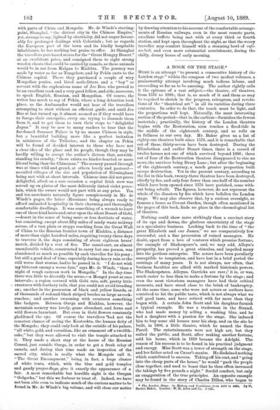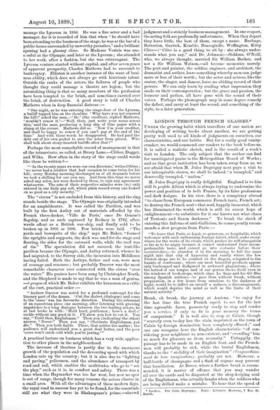A BOOK ON THE STAGE.*
HERE is an attempt "to present a consecutive history of the London stage" within the compass of two modest volumes, a praiseworthy attempt involving much tedious labour, and succeeding so far as to be amusing. The author rightly calls it the epitome of a vast subject,—the theatre, all theatres, from 1576 to 1888; that is, so much of it and them as may be required to sketch in the progress, retrogress, and revolu- tions of the "theatrical art" in all its varieties during three centuries. In order to do that, the touch must be light, and the proportions well kept. Naturally, the most interesting section of the period—that is, the earliest—furnishes the fewest materials; practically, the history of the London theatres begins with the Restoration, soon reaches a flood-tide in the middle of the eighteenth century, and so rolls on in fullness to our own day. Mr. Baker gives us a list of eighty-one theatres built since 1576, and it is remarkable that out of these, thirty-seven have been destroyed. During the Elizabethan and earlier Stuart times, there is a record of twelve houses not one of which survived beyond 1666; three out of four of the Restoration theatres disappeared to rise no more, the survivor being Drury Lane ; but after the beginning of the eighteenth century, a much greater proportion built escape destruction. Yet in the present century, according to the list in this book, twenty-three theatres have been destroyed, chiefly by fire, and only four fewer than one-half of the number which have been opened since 1576 have perished, some with- out being rebuilt. The figures, however, do not represent the whole of the disasters by fire which have befallen the London stage. We may also observe that, by a curious oversight, so famous a house as Covent Garden, though often mentioned in the pages of this book, finds no place in the chronological list of theatres.
Nothing could show more strikingly than a succinct story of its ups and downs, the glorious uncertainty of the stage as a speculative business. Looking back to the time of "the great Elizabeth and our James," we see comparatively few successful, and a fine procession of ruined managers. No doubt, apart from a love of ventures which promise fortune, the example of Shakespeare's, and, we may add, Alleyn's• prosperity, has proved a great stimulus, and impelled many into the perilous enterprise. The actors have been peculiarly susceptible to temptation, and have lost in a brief period the earnings of many years. It is not always, nor often, that business faculties are allied with marked histrionic powers. The Shakespeares, Alleyns, Garricks are rare ;7 it is, or was, much easier to lose than to make a fortune by the stage ; and even the most victorious managers have had their critical moments, and have stood close to the brink of bankruptcy. At the same time, some who were not actors or authors have contrived to hit the public taste, which is not always what we call good taste, and have retired with far more than they began with. A certain John Scott and his daughter furnish a typical example. He was a tradesman in the Strand, who had made money by selling a washing blue, and he had a daughter with a passion for the stage. She induced • him to buy some old houses near his shop, and on the site he built, in 1806, a little theatre, which he named the Sans Pareil. The entertainments were not high art, but they suited the public, and Scott, after making another fortune, sold his house, which in 1819 became the Adelphi. The reason of his success is to be found in his practical judgment and energy. Miss Scott was a tower of strength on the stage, and her father acted on Cteaar's maxim. He disdained nothing which contributed to success. Taking off his coat, and "going into the cheap parts of the house," he would "pack the people close together, and used to boast that he thus often increased the takings by five pounds a night." Sordid conduct, but only an exaggeration of the true principles. An opposite example may be found in the story of Charles Dillon, who began to • The London Stage: its History and Traditions iron 1578 to If Iffti. By Barton Baker. London : W. H. Allen and Co. 2 Tols.
manage the Lyceum in 1856. He was a fine actor and a bad manager, for it is recorded of him that when "he should have been attending to the business of the stage, he was at the bar of a public-house surrounded by unworthy parasites," and a brilliant opening had a gloomy close. So Madame Vestris was sue- c2ssful at the Olympic, and later at the Lyceum ; she attended to her work, after a fashion, but she was extravagant. The Lyceum venture started without capital, and after seven years of apparent prosperity, Charles Mathews had to succumb to bankruptcy. Elliston is another instance of the want of busi- ness ability, which does not always go with histrionic talent. Outside the ranks of the actors, the failures of people who thought they could manage a theatre are legion; but the astonishing thing is that so many members of the profession have been tempted to the brink, and sometimes carried over the brink, of destruction. A good story is told of Charles Mathews when in deep financial distress :—
" One night, as he was entering the stage-door of the Lyceum, a bailiff tapped him on the shoulder. 'Why have you not renewed the bill r asked the man.—' He' (the creditor), replied Mathews,
wouldn't renew Well, then, just write your name across this,' said the man, producing a long slip of blue paper with a stamp at the corner. Mathews did so. Now I'm your creditor, and shall be happy to renew if you can't pay at the end of the time.' And with these words he disappeared. He had paid the debt out of his own pocket to save the actor from prison. Who shall talk about stony-hearted bailiffs after that ?"
Perhaps the most remarkable record of management is that of the triumvirate, so called, at Drury Lane,—Cibber, Dogget, and Wilks. How often in the story of the stage could words like these be written ?—
" g In the twenty years we were our own directors,' writes Cibber ; we never had a creditor that had occasion to come twice for his bill; every Monday morning discharged us of all demands before we took a shilling for our own use. And from this time we never asked any actor, nor were desired by them, to sign any agreement whatsoever. The rate of their respective salaries were (six) only entered in our daily pay roll, which plain record every one looked on as good as a city security."
The "circus" is not excluded from this history, and the ring
stands beside the stage. The Olympic was originally intended for an amphitheatre. It was called the Pavilion, and was built by the first Astley out of materials afforded by the French three-decker, Ville de Paris,' once De Grasse's flagship, and as such captured by Rodney in 1782, after- wards afloat as a British war-ship, and finally sold to be broken up in 1805 or 1806. Few bricks were laid. "The yards and bowsprits of the ship," says Mr. Baker, "formed the uprights and supports, the deck was used for the stage and flooring, the sides for the outward walls, while the roof was of tin." The speculation did not succeed, the tent-like pavilion became the Olympic, and Astley returned, whence he had migrated, to the Surrey side, the incursion into Middlesex having failed. Both the Astleys, father and son, were men of courage and resource ; but probably Ducrow was the most
remarkable character ever connected with the circus "over the water." His praises have been sung by Christopher North, and the Shepherd is made to say that he was a man of genius, --d propos of which Mr. Baker exhibits the horseman as a critic of the curt, practical order :— "Andrew Ducrow was noted for a profound contempt for the literary part of the drama. Cut the dialect (dialogue) and come to the 'osses ' was his favourite direction. During the rehearsal of an equestrian piece one morning, after listening with growing impatience to a long dialogue between the two leading actors, he at last broke in with : Hold hard, gentlemen ; here's a deal o' cackle without any good in it. I'll show you how to cut it. You . say, "Yield thee, Englishman." Then you (indicating the other) answer, "Never." Then you say, "Obstinate Englishman, you die." Then you both fights. There, that settles the matter; the audience will understand you a great deal better, and the poor 'oases won't catch cold while you're jawing."
A practical lecture on business which has a very wide applica- tion to other places in the neighbourhood.
The increase of theatres is partly fine to the enormous growth of the population and the devouring speed with which London eats up the country; but it is also due to "lighting and paving," policemen, and the abundance of transport by road and rail, which enables the multitudes who go to "see the play," such as it is, in comfort and safety. There was a time when the Haymarket was too far west, but now no spot is out of range, though for many reasons the actors cluster in
a small area. With all the advantages Of these modern days, the royal road to. success has yet to be found, for the essentials
still are what they were in Shakespeare's prime,—shrewd judgment and a strictly business management. In one respect, the acting folk are profoundly unfortunate. When they depart they leave little, the best of them, except a name. Burbage, Betterton, Garrick, Kemble, Bracegirdle, Woffington, Kitty Clive—(" Clive is a good thing to sit by : she always under- stands what you say," said Dr. Johnson)—Siddons, O'Neill, who, we always thought, married Sir William Becher, and not a Sir William Wrixon,—all become memories merely. The poet and painter, the soldier, engineer, and architect, the dramatist and author, leave something whereby men can judge more or less of their worth ; but the actor and actress, like the orator, the singer, and dancer, leave no abiding record of their powers. We can only learn by reading what impression they made on their contemporaries ; but the grace and passion, the humour and pathos, all have gone with the sound of their voices. Perhaps the phonograph may in some degree remedy the defect, and carry at least the sound, and something of the style, to a later generation.



































 Previous page
Previous page